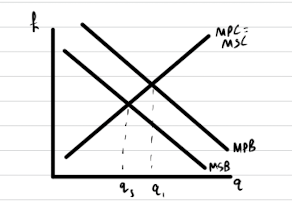AQA A-Level Economics 15
Explain why, in a free market, sugary drinks may be overconsumed. (June 2017)
A market is a place where buyers and sellers meet to exchange goods and services. A free market has no government intervention so price and quantity is determined by demand and supply only. Sugary drinks are a demerit good, and these are over-consumed because of irrational human behaviour and the ignorance of negative externalities.
Demerit goods have negative externalities in consumption, which are the costs from a transaction that negatively impact a third party. The third party is anyone apart from the buyer or seller, so for example, when a person regularly consumes a sugary drink they ignore the fact that they become unhealthy and therefore may cause trouble to family or friends in the long run, or visit the doctor more often which would burden the taxpayers.

The diagram shows that demand and supply meet at q1, which is shown where MPC meets with MPB. These two curves represent the private benefit and private cost, so supply and demand. MSB and MSC show where the forces of supply and demand should be if externalities were not ignored. We can see that marginal social benefit is lower than marginal private benefit because there is a marginal external cost from the consumption of sugary drinks. These are ignored and hence we are not at the socially optimal quantity which is q1. Therefore, this diagram shows sugary drinks are being over-consumed.
Apart from the externalities being ignored, sugary drinks are over-consumed because of the imperfections of the human brain. Behavioural economics is the study of psychology embedded into Economics and it explains some of this behaviour. Consumers have bounded self-control. For example, when selecting a drink they are more likely to be tempted by the colourful fizzy drinks than the healthy but boring looking water. Then, consumers also have bounded rationality as they prefer to use mental shortcuts to make quick decisions, and they fail to make accurate calculations about the impact of this decision on their long term health, or on other people (third parties). Hence, demand for sugary drinks is higher than it should be and this could be reduced by government intervention such as provision of information or through behavioural economics techniques.
These are the two main reasons why sugary drinks are over-consumed.